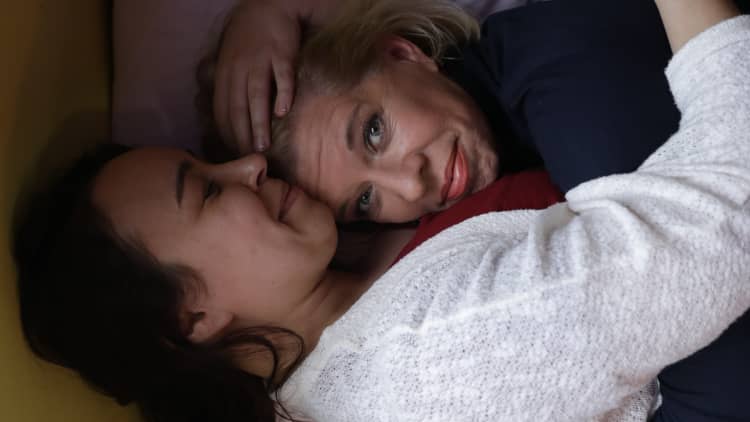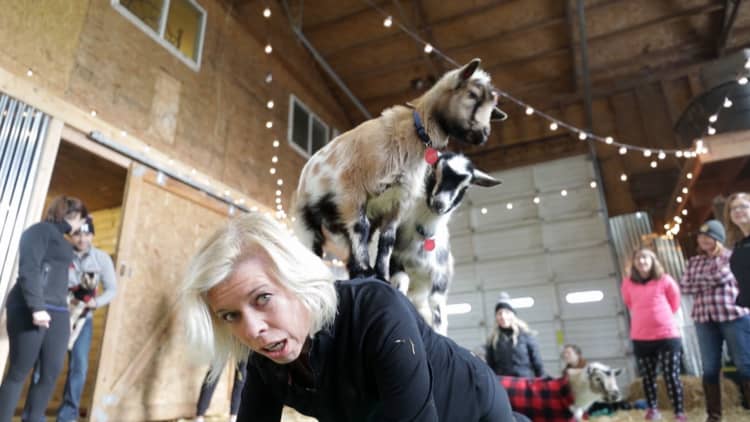The secret is out.
Goats are not stupid. They're not mean. They don't even stink. They're actually intelligent, friendly, and soft.
At least that's the case with the baby goats which jump on the backs of paying customers attending Original Goat Yoga classes in Corvallis, Oregon.
Downward Dog, meet upright goat. People actually pay $35 to do yoga in a barn with goats.
It's surprisingly relaxing to feel a couple of small animals jump up onto your back while you're trying to maintain something difficult, like a plank position. The little goats' hooves provide a bit of a massage as they move to keep their balance. It makes you giggle, and it certainly takes your mind off the yoga.
"I never lived in a spot where I could have goats," says owner Lainey Morse. "I wanted them my whole life."
So a few years ago she bought some property, purchased a copy of "Raising Goats for Dummies" (a real book), and took possession of her first two goats. She now has a small herd.
But goat yoga? Really?
In her first year of business, 2016, Morse made $160,000 in revenue. This year she expects to double that figure and finally be profitable. Moving the business into the black took longer than this 46-year-old accidental entrepreneur expected.
"I just didn't think it would be six figures in expenses," she says. More on that in a moment.
An idea is born of heartache
The idea of marrying yoga and goats came about in what Morse calls "a series of serendipity moments" that followed some not so pleasant ones. She got divorced, and then she was diagnosed with an autoimmune disease. "I was super depressed," she says.
Morse found solace on the farm: "I would go out every day and spend time with my goats." She dubbed that special time "Goat Happy Hour," and she began inviting people over.
Morse's friends found the goats a stress reliever. One guest was a yoga instructor.
"We're standing out in my field, and it's just beautiful with the mountain views, and the goats all standing around us," she says. The friend told her they should have a yoga class there.
Morse replied, "'Okay, but the goats are going to be all over the humans." The friend's reaction? "Cool."
Lainey Morse had been working in marketing, so she used her PR skills and took some photos of that first goat yoga class, sending them to Modern Farmer.
"Within a few minutes, they contacted me and said, 'We have got to do a story on this.'" The story came out and changed her life. "You never know what it means when something goes viral, but it feels like a roller coaster going 100 miles an hour, and you can't get off."
By the time Morse had the business fully up and running, "I had over 2,300 people on the wait list." She started listing classes on Facebook, and "realized I can't have 400 people on my farm showing up for goat yoga." She soon came up with a registration platform to bring order to the process.
The business grew so quickly that Morse left her marketing job in November 2017.
"I'd be in the office, and I'd say, 'I have to go to the bathroom,' or, 'I have to go to the bank,' and I'd go down the street and do a media interview," she says. "It was just taking over my life, and finally my boss was like, 'Listen, this is not working.'"
Leaving a job with a secure paycheck and medical benefits was scary.
"Everyone thinks I'm an international whack job," she laughs. That said, a friend loaned Morse $75,000 to get the business going and cover some bills.
"I figured it would take me about $50,000 in expenses," she says, "and it's actually ended up about triple that."
The big mistake
Morse admits she spent way too much money trying to trademark "Goat Yoga." Her application was repeatedly denied.
"They said it's too generic, it's like hot yoga," she explains.
She grew frustrated as other operations calling themselves "goat yoga" popped up around the country, operations which she believes are circus-like compared to the farm experience she provides.
"I get attacked by animal activists a lot, because they think I'm associated with those other people," she says. "That's the hard part, because I could have gone after them and they would've had to change their name [from 'goat yoga']. Now I can't, and that was really hard for me."
But it's not a complete loss. Morse changed the name of her company to Original Goat Yoga, and she succeeded in trademarking the logo she created showing a goat in a lotus position.
"I have a full line of merchandise," she says.
There were other big expenses along the way, like spending thousands of dollars on tents to protect outdoor sessions during inclement weather, only to see the tents destroyed in wind storms. She also had to buy special mats for customers because the goats would eat (or poop on) yoga mats people brought themselves.
Then there was the need for insurance, because even though Morse says none of her goats has ever attacked anyone, she knew she had to protect herself.
"It took a really long time to find liability insurance," she says. "I got turned down six times." When someone finally agreed to cover her for about $1,200 a year, "We went out and celebrated, because I knew it's 'go time.'"
Nigerian Dwarfs
People have come from as far as Japan and Australia for Morse's classes just to meet the goats.
Morse owns Nigerian Dwarf goats, miniature animals which max out at 30-40 pounds. Sometimes she will entice the youngest goats to get involved by putting treats on a customer's back or belly, and when the goats get too big to jump, they merely trot around the class or sit nearby. As for upkeep: "Dogs are much more expensive than goats."
Classes are now held at three locations in Oregon, and Morse has brought in partners who can provide farm property and more goats. She usually limits class sizes to 30 to keep a good human-to-goat ratio. She's also making money licensing out the "Original Goat Yoga" name and logo to farms in four other states, including New York. Launch classes in these new locations have sold out.
Oregon State researchers are working with her about goat-human interaction, and Michigan State has started offering goat yoga classes through its urban farm program. Morse has done corporate events for Nike and Kaiser Permanente, and she is looking for property to open a "Goat-el," where people can stay for the entire goat experience.
But what Lainey Morse enjoys most of all, besides spending time with her goats, is seeing how happy they make other people.
"I remember a lady coming. She says, 'I almost didn't come. I bought my tickets awhile ago and my husband was diagnosed with cancer, and I've been his caregiver and it's been so hard on me.'" The woman had planned to cancel her goat yoga session, but her daughter talked her out of it. "It's been the best decision I could've made, because it's the first time I've smiled in months," she told Morse.
Recalling the story, Lainey Morse pauses for a moment. "That's powerful."
More from Strange Success: These 30-somethings are selling cans of Canadian air for $20 — and bringing in more than $230,000 a year
Like this story? Check out the Strange Success podcast.







